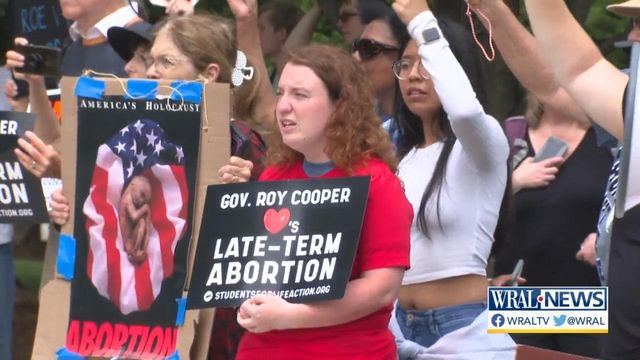Cooper vetoes new abortion restrictions, setting up first test of GOP's new supermajority
The bill would reduce the cutoff for many abortions from 20 weeks to 12 and add other restrictions to women seeking abortions and clinics seeking to provide them.
Posted — UpdatedDemocratic Gov. Roy Cooper officially rejected a Republican-backed abortion bill Saturday — a move that will test his veto power under a new GOP supermajority.
"When women's health is on the line, I'll never back down," Cooper told a cheering crowd at a rally in downtown Raleigh, where protesters carried homemade signs with slogans such as "my body, my choice," and "abortion is health care." He added: "This bill has nothing to do with making women safer and everything to do with banning abortion."
Conservative groups including the N.C. Values Coalition, meanwhile, decried the move at a smaller rally of their own, where proponents of the bill chanted "pro-life is pro-love" and "human rights begin in the womb," while carrying placards saying "Gov. Roy Cooper [loves] late-term abortions."
Cooper's veto "would crush provisions to give women more opportunities to choose life, improve safety standards of clinics, and stop the barbaric painful practice of partial birth abortion," N.C. Values Coalition Executive Director Tami Fitzgerald said in a statement.
Now a key question looms: Will any Republican lawmaker vote to defeat one of the Republican Party’s biggest goals of the last 50 years?
The GOP has just enough seats in the state House and Senate to override Cooper’s veto. If every Republican votes to override his veto, the new 12-week ban would become law. But a single defection could doom the proposal, Senate Bill 20, which speed to approval in the legislature less than 48 hours after being introduced — a point of contention for Democrats who think lawmakers should have had more time to consider the bill.
"Governor Cooper has spent the last week actively feeding the public lies about Senate Bill 20 and bullying members of the General Assembly," Senate Leader Phil Berger, R-Rockingham, said in a statement "He has been doing everything he can, including wasting taxpayer money on poorly attended events, to avoid talking about his own extreme views on abortion. I look forward to promptly overriding his veto."
"If just one Republican in either the House or the Senate keeps a campaign promise to protect women's reproductive health, we can stop this ban," Cooper said Saturday. "... There are four legislators who made these promises, but I think there may be more who know in their hearts and minds that this is bad."
The bill would ban many abortions after 12 weeks, shortening the current 20-week cutoff by two months. There are exceptions, including for cases of rape or to save the life of the mother. It also includes strict new rules on clinics that could potentially force many clinics to shut down. The new rules will also make it more onerous for women to get an abortion within the shortened time period, if any clinics remain open to provide abortions.
The North Carolina Republican Party criticized Cooper for scheduling the rally the day before Mother’s Day. The party said it believes the general public supports its plan. “The pandering culminates in a manufactured rally to veto the widely supported Care for Women, Children and Families Act on Mother's Day weekend,” the NCGOP wrote on Twitter Thursday.
The state party’s spokesman, Jeff Moore, told WRAL News: “Despite the governor's rhetoric, this proposal is well within the mainstream of public opinion and we look forward to an override of his promised veto.”
Cooper said at the Rally: "Mainstream bills don't get written in secret, kept under lock and key, introduced in the dark of night."
Focus on four Republicans
Cooper’s last-minute push highlights the stakes at play: Both sides agree the bill would make massive changes to state law for all pregnant women, now or in the future. But its fate hangs by a thread, with any one of the state’s 102 Republican lawmakers hypothetically able to kill the bill.
The one GOP defection the Democrats need to defeat the bill is far from guaranteed. Because of how their districts are drawn, nearly every state lawmaker’s biggest chance of losing reelection doesn’t come in the general election every two years — but rather in the party primary. That means that for Republicans, voting against an abortion ban could be akin to political suicide in a party whose primaries are often decided by a large turnout of religious social conservative voters.
But that political calculus doesn’t necessarily apply in the small number of competitive districts that exist, where candidates on either side typically need to be more moderate in order to win.
In the past few days Cooper has held roundtable discussions in Charlotte and Wilmington, hoping to stir up local voters and remind them of the campaign promises made by those Republicans who represent them.
One of them is Rep. Tricia Cotham, who left the Democratic Party last month to join the GOP.
When she was a Democrat Cotham was a staunch advocate for abortion rights, even publicly telling the story of her own abortion several years ago as she urged Republicans not to restrict abortion access then.
She also co-sponsored a bill earlier this year to make abortions easier to get in North Carolina. And when she switched parties last month she emphasized that her personal beliefs hadn’t changed; she said she just felt disillusioned with the Democratic Party. Cotham then changed positions and voted for the abortion ban. She didn’t explain her vote during the public debate over the bill, and she hasn’t responded to multiple requests for comment on what made her reverse her stance.
Cooper’s other Republican targets are another Charlotte-area lawmaker, Rep. John Bradford, and two from Wilmington: Sen. Michael Lee and Rep. Ted Davis.
For Democrats, their best chance could be Davis. He was clear in his 2022 campaign that he opposed any effort to further restrict abortions, and he more or less kept to that promise last week, skipping the vote on the bill when it first passed the House. Since then, Davis has declined to say what he might do when the override vote comes up.
Davis declined to comment when Cooper publicly called on him to stand by campaign pledges to keep the state’s abortion laws as they have been.
Restrictions and provisions
The bill represents a compromise in a GOP caucus that has wide ranging views on the issue, including members favoring everything from a full abortion ban to keeping the laws the same.
Supporters say abortions through the second trimester of a woman's pregnancy are unacceptable and that this bill will save lives. Cooper and other opponents call the bill dangerous.
The bill takes North Carolina's current ban on abortions after 20 weeks — with exceptions for medical emergencies — and moves that to the 12 week mark. The ban would kick in later in cases of rape or incest (20 weeks) or life-limiting fetal abnormalities (24 weeks). Abortion would stay legal any time a doctor declares a medical emergency.
“This monster abortion ban is full of medically unnecessary and dangerous restrictions on abortion care that go against best medical practices,” Dr. Katherine Farris, the chief medical officer of Planned Parenthood South Atlantic, told protesters Saturday. “Abortion bans are dangerous and deadly.”
The spaced-out appointments will be difficult to keep, Democrats have argued, for women with full-time jobs, women with other children to care for and women who don't have money for travel. There are only 14 abortion clinics in North Carolina, located in nine of the state's 100 counties.
Abortions must be performed at a clinic or a hospital, and Democratic lawmakers said 20 North Carolina counties don't have a hospital.
The bill also calls for new clinic licensing rules for clinics. There's some dispute just what the bill requires here, but Planned Parenthood, which operates six of the state's 14 clinics, has said none of its facilities meet the expected new regulations and would either have to close or upgrade at unknown costs.
Doctors groups have complained about new paperwork and reporting requirements in the bill, which they say are not medically necessary.
She said proponents of the bill who rallied Saturday wanted to send a message to Cooper as he signed the veto: “There are pro-lifers in North Carolina who do not agree with what he's doing.”
“Governor Cooper and all the other legislators need to know that there are people who support this bill,” Finch said. “They are elected to do what we asked them to do. We asked them to represent us and, in North Carolina, we are people who want this bill to go through.”
Related Topics
• Credits
Copyright 2024 by Capitol Broadcasting Company. All rights reserved. This material may not be published, broadcast, rewritten or redistributed.






